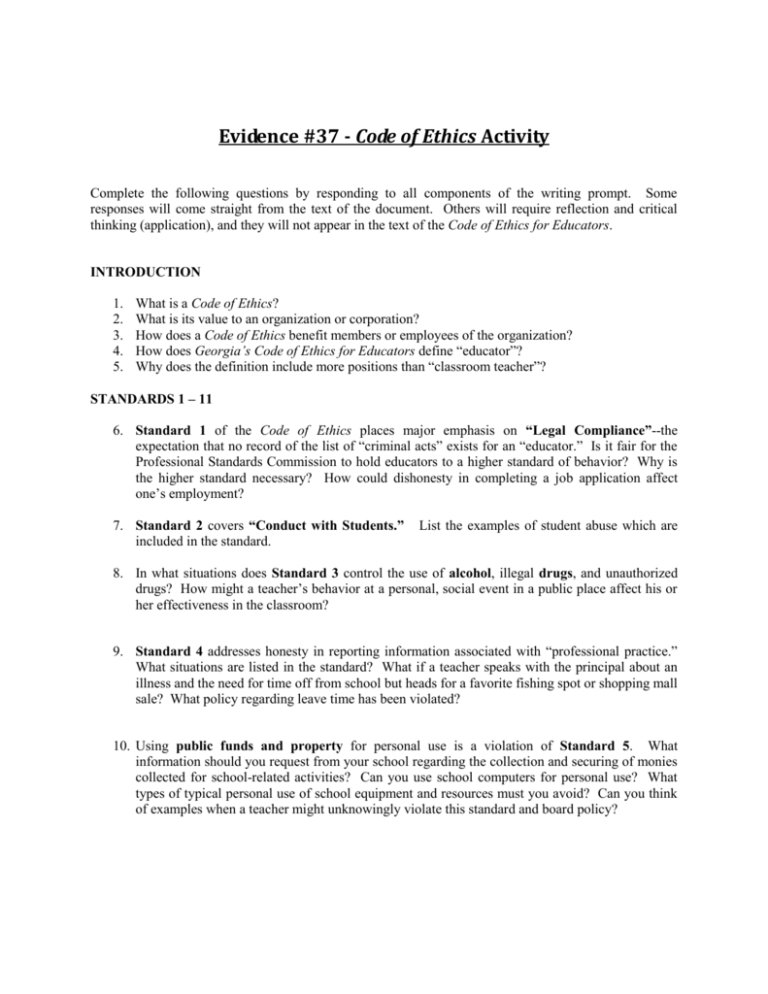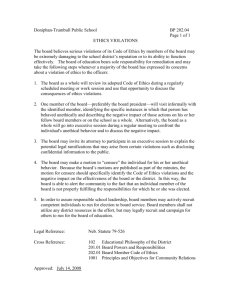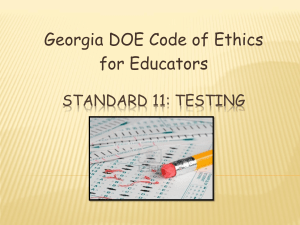Code of Ethics for Educators Activity
advertisement

Evidence #37 - Code of Ethics Activity Complete the following questions by responding to all components of the writing prompt. Some responses will come straight from the text of the document. Others will require reflection and critical thinking (application), and they will not appear in the text of the Code of Ethics for Educators. INTRODUCTION 1. 2. 3. 4. 5. What is a Code of Ethics? What is its value to an organization or corporation? How does a Code of Ethics benefit members or employees of the organization? How does Georgia’s Code of Ethics for Educators define “educator”? Why does the definition include more positions than “classroom teacher”? STANDARDS 1 – 11 6. Standard 1 of the Code of Ethics places major emphasis on “Legal Compliance”--the expectation that no record of the list of “criminal acts” exists for an “educator.” Is it fair for the Professional Standards Commission to hold educators to a higher standard of behavior? Why is the higher standard necessary? How could dishonesty in completing a job application affect one’s employment? 7. Standard 2 covers “Conduct with Students.” included in the standard. List the examples of student abuse which are 8. In what situations does Standard 3 control the use of alcohol, illegal drugs, and unauthorized drugs? How might a teacher’s behavior at a personal, social event in a public place affect his or her effectiveness in the classroom? 9. Standard 4 addresses honesty in reporting information associated with “professional practice.” What situations are listed in the standard? What if a teacher speaks with the principal about an illness and the need for time off from school but heads for a favorite fishing spot or shopping mall sale? What policy regarding leave time has been violated? 10. Using public funds and property for personal use is a violation of Standard 5. What information should you request from your school regarding the collection and securing of monies collected for school-related activities? Can you use school computers for personal use? What types of typical personal use of school equipment and resources must you avoid? Can you think of examples when a teacher might unknowingly violate this standard and board policy? 11. Standard 6 (“Remunerative Conduct”) is tied closely to Standard 5. As an educator, you cannot benefit financially from your position with the school system. List 2 examples from the text which relate to Standard 6. Consider this situation: Your students are having difficulty with a skill you are teaching, so you schedule a much needed tutoring session after school. Can you charge your students for the extra help? Let’s try a different situation. Can you tutor other students in your or their home and charge for your services? 12. What are some examples of confidential information you can access about students? What does Standard 7 say about sharing that information with any unauthorized person? How is the standardized testing process governed by the standard? What behaviors in a testing situation are considered violations of the standard? 13. Standard 8 covers “Abandonment of Contract.” What is your responsibility in honoring the contract you sign to work for the local school system? What examples are listed as violations of the standard? How is daily performance of your regular assigned duties tied to the standard? 14. Standard 9 addresses “Required Reports.” List the examples of “unethical conduct” which you are required to report. What do you need to know about the school process for reporting child abuse? Does your teaching position limit your ability to act as a private citizen in reporting abuse? Suppose you are a teacher and a student reports to you that another teacher is making unwanted advances. Where does your loyalty and legal obligation lie in such a situation…with your colleague or with the student? What is your responsibility under the Code of Ethics for Educators? 15. How does Standard 10 define “unethical conduct”? List the 2 parts of the definition. 16. What other Standard is emphasized (and repeated) by Standard 11? What 2 aspects of testing are included in Standard 11? DISCIPLINARY ACTION 17. List the 3 actions the Professional Standards Commission can take to discipline an educator who has violated the Code of Ethics for Educators. FINAL REFLECTIONS and PERSONAL APPLICATION Consider the statement “Do no harm.” 18. If you practice that advice, what daily actions will characterize your behavior? How will you interact with others? 19. How will your planning, teaching, and use of time and resources be affected by the advice? 20. What about the teacher/student relationship makes a child more likely to submit to abuse and then not report it?










![Our_Ethical_Dilemma[1]](http://s3.studylib.net/store/data/009760750_1-4e53c44eeb9ca309645ec298d5928f3c-300x300.png)
